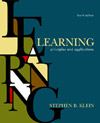| association | The linkage of two events, usually as the result of a specific experience.
|
 |
 |
 |
| associative shifting | The transfer of a response from one stimulus to a second stimulus when the second stimulus is gradually introduced and then the first stimulus removed.
|
 |
 |
 |
| behaviorism | A school of thought that emphasizes the role of experience in determining actions.
|
 |
 |
 |
| cause and effect | When one event produces a second event.
|
 |
 |
 |
| complex ideas | The association of sensory impressions or simple ideas.
|
 |
 |
 |
| conditioned reflex | The acquisition of a new S-R association as a result of experience.
|
 |
 |
 |
| conditioned response (CR) | A learned reaction to a conditioned stimulus.
|
 |
 |
 |
| conditioned stimulus (CS) | A stimulus that becomes able to elicit a learned response as a result of being paired with an unconditioned stimulus.
|
 |
 |
 |
| contiguity | The temporal pairing of CS and UCS.
|
 |
 |
 |
| counterconditioning | The elimination of a conditioned response when the conditioned stimulus is paired with an opponent or antagonistic unconditioned stimulus.
|
 |
 |
 |
| debriefing | An experimenter informing a subject about the nature of a study after the subject finishes participating in the study.
|
 |
 |
 |
| extinction | The elimination or suppression of a response caused by the discontinuation of reinforcement or the removal of the unconditioned stimulus.
|
 |
 |
 |
| functionalism | Early school of psychology that emphasized the instinctive origins and adaptive functions of behavior.
|
 |
 |
 |
| generalization | Responding in the same manner to similar stimuli.
|
 |
 |
 |
| informed consent | A written agreement indicating that a subject is willing to participate in a psychological study.
|
 |
 |
 |
| instinct | An inherited pattern of behavior common to members of a particular species.
|
 |
 |
 |
| law of effect | The process when a reward strengthens an S-R association.
|
 |
 |
 |
| law of exercise | Thorndike's idea that the strength of a stimulus-response connection can be increased with use.
|
 |
 |
 |
| law of readiness | Sufficient motivation must exist in order to develop an association or exhibit a previously established habit.
|
 |
 |
 |
| learning | A relatively permanent change in the ability to exhibit a specific behavior that occurs as a result of experience.
|
 |
 |
 |
| resemblance | The similarity in appearance of two or more events.
|
 |
 |
 |
| reward | a satisfying state of affairs that results in the strengthening of an S-R association
|
 |
 |
 |
| simple ideas | The mind's representation of a sensory impression.
|
 |
 |
 |
| unconditioned reflex | An instinctual response to an environmental event.
|
 |
 |
 |
| unconditioned response (UCR) | An innate reaction to an unconditioned stimulus.
|
 |
 |
 |
| unconditioned stimulus (UCS) | An environmental event that can elicit an instinctive reaction without any experience.
|



 2002 McGraw-Hill Higher Education
2002 McGraw-Hill Higher Education